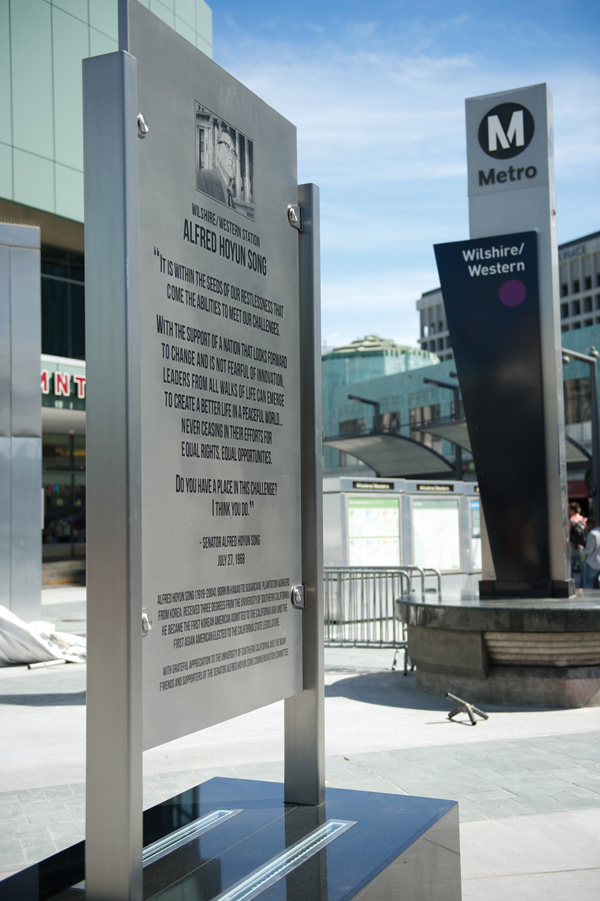Above photo by Gary Leonard
by JIMMY LEE
Countless people will discover the name of Alfred Hoyun Song. At one of Los Angeles’s busiest intersections—the crossroads of Wilshire and Western avenues—a memorial in his honor was unveiled on Oct. 3. Now the scores of individuals who scamper daily along this northeast corner in Koreatown, a key transit hub in the city, will see Song’s face emblazoned on the steel of the 10-foot tall monument.
And they’ll probably wonder: So just who was Alfred Song?
He was the first Asian American elected to the California legislature, responsible for many of the measures that protect the rights of those who walk past the memorial. From 1962 to 1978, from both the state Assembly and Senate, he authored more than 200 pieces of legislation, which include the California Lemon Law, the enforcement of child support and the California Evidence Code.
He also stands as one of the first Korean Americans elected to statewide office in the continental United States. And he is now the first Korean American with a subway stop named after him. It now bears the distinction of being called the Wilshire/Western Alfred Hoyun Song Station.
His life was the epitome of pulling up your bootstraps and making a name for yourself. Born in 1919 in Hawaii to a sugar plantation worker father and his picture bride wife, Song eventually made the trek across the Pacific and graduated from the University of Southern California. Then he earned a law degree from USC, and became the first Korean American to pass the state’s Bar. But no one would hire him. “In California, I felt the full force of discrimination for the first time,” Song said in 1980. “I had a difficult time finding employment, especially at the larger law firms. So I decided that I would have to establish my own practice.”
Song also had a knack for connecting with people. Ed Roski was one of them. A prominent local businessman (he was the developer responsible for building Staples Center), Roski met Song decades earlier through his father, who was a real estate developer before him. And at the memorial dedication ceremony, Roski shared the story of when Song called him up after returning from the Vietnam War. That a prominent politician would contact him and offer him advice made Roski feel special. But then he learned that he wasn’t the only person to get that one-on-one attention. “He did it with a lot of individuals,” said Roski, feigning disappointment.
Leslie Song Winner, standing in front of the L.A. subway memorial honoring her father. (Photo by Jimmy Lee)
“He ran for office because he was a natural leader,” said Leslie Song Winner, Song’s daughter. “People wanted him to run. It’s not like he wanted to run.”
And Song ran on his own terms. When he decided to pursue a seat in the California Assembly in 1962, there were some who advised Song not to put his picture on campaign materials. They didn’t want potential voters to know his ethnicity, since the name Song was ethnically ambiguous. He did it anyway.
“Hell, this is one of the reasons I am trying,” Song thought. “I want to see whether it can be done.”
The memorial is proof that it was.








